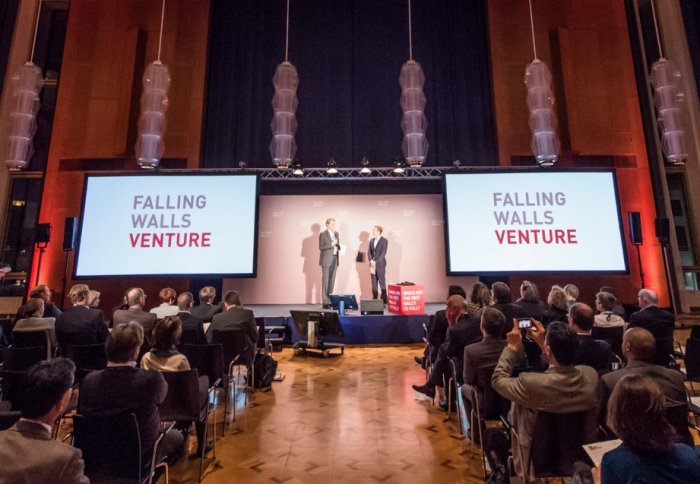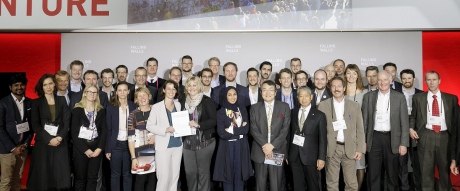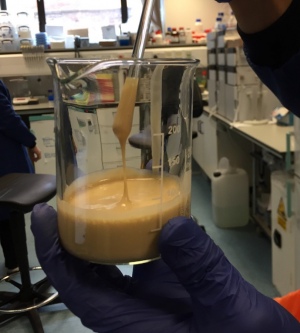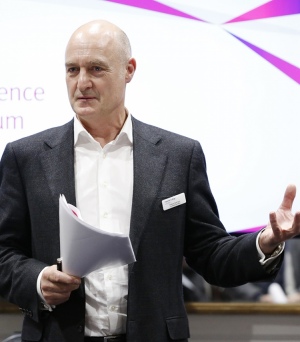Engineering graduate shortlisted for Science Start-up of the Year

An Imperial College London graduate's company has been shortlisted for Science Start-up of the Year.
Haidin Rashid, who studied Innovation Design Engineering at the Dyson School of Design Engineering at Imperial, co-founded Materialize.X, a data driven material science company that have developed a non-toxic adhesive for wood products
The company was a finalist at the Falling Walls Venture in Berlin, Germany, a global forum for innovative science-based start-ups.
Haidin and his team presented their breakthrough business concept to high-profile investors and a distinguished jury of science and business leaders.

Falling Walls Venture finalists
Falling Walls Venture is part of an annual global gathering of industry and science leaders from more than 80 countries. The conference, which takes place every year on the anniversary of the fall of the Berlin Wall, also hosted 20 of the world's leading scientists who presented their latest research.

Non-toxic adhesive
Imperial nominated Materialize.X who have developed a new formaldehyde-free adhesive and optimisation software to revolutionise the engineered wood industry.
Haidin explained that 90 per cent of adhesives used in the engineered wood industry are formaldehyde-based which is toxic and carcinogenic. But there is increasing demand from consumers for non-toxic alternatives.
Haidin said: “We are facilitating engineering-wood companies, large and small, to cope with regulations by offering a non-toxic bio-adhesive. Our optimisation software is tailored to their complex manufacturing process and allows manufacturers to increase productivity and integrate new technologies faster into their production lines.”
Supporting entrepreneurs
Professor David Gann, Imperial’s Vice President (Innovation), was a member of the jury panel, responsible for selecting this year’s winner.

Vice President (Innovation), Professor David Gann
Speaking from Berlin, Professor Gann said: “We congratulate Haidin and Materialize.X for being shortlisted for this award, which showcases the most innovative science based start-ups from around the world.
“At Imperial we support entrepreneurs coming from all areas of science, engineering, medicine and business and we have built the infrastructure for staff and students to experiment and test their ideas to turn them into spinouts or start-ups.
“Our Enterprise Lab facility helps people find time, space and resources to take the next step and translate ideas from science and technology into practice.
“Our new White City campus has the facilities for ideation, incubation and to support sustained growth to scale-up businesses from deep science.”
Fake news challenges
Professor Nick Jennings, Vice-Provost (Research and Enterprise) at Imperial, attended the Falling Walls Circle, an international meeting for science strategists and decision-makers. The challenges around fake news was the main agenda item at the annual meeting.
Professor Jennings said: “The spread of misinformation or fake news can be challenging for experts and impact their scientific approach.“It is vital that governments, industry and the wider pubic are informed by high-quality and evidence-based research, from leading and authoritative experts. “Imperial is a world-class institution with a reputation for excellence in research and education in science for the benefit of society.”
The event was held at the British Embassy in Berlin.
The competition was won by JeNaCell, a German healthcare start-up that are working to provide better care for burn victims.
Other finalists at the event included an environmentally-friendly and biodegradable ink, a sensor technology that makes the surfaces of devices and machines sensitive to touch, and a transgenic mouse that can be used to investigate new immunotherapies against cancer.
Imperial’s Enterprise Lab offers state-of-the-art digital tools, techniques and training to help students build better business plans and improve their performance at pitching to potential clients, partners or investors. It also give students the knowledge, skills and experience to compete for the best jobs and make a real impact in companies that hire them.
Article text (excluding photos or graphics) © Imperial College London.
Photos and graphics subject to third party copyright used with permission or © Imperial College London.
Reporter
Stephen Johns
Communications Division